Refugees
Syrian refugee family that Pope Francis brought to Rome prays for him as they build new life
ROME (AP) — Just before breaking the Ramadan fast on Sunday evening, Hasan Zaheda played basketball with his son in the tiny courtyard of the basement-level apartment on Rome’s outskirts where the refugee family is rebuilding their lives.
They have no pictures from their native Syria – they fled Damascus at the height of the civil war with only one change of clothes, diapers and milk for their toddler. But there is a framed photo of little Riad meeting Pope Francis, who brought them and two other Muslim families back with him to Italy from refugee camps in the Greek island of Lesbos almost a decade ago.
Hasan Zaheda plays basketball with his son Riad in the courtyard of their house in Rome, Sunday, March 2, 2025. (AP Photo/Alessandra Tarantino)
“He’s a gift from paradise,” Zaheda said Sunday, chuckling. “Pope Francis, a gift from our God, that God sent us to save us.”
As the Zahedas began to observe the holy month of Ramadan, Francis, 88, entered his third week of battling pneumonia in a hospital not far away. The least they can do, the family said, is to be close to him in prayer night and day.
“We look for his health bulletin every day,” said the mother, Nour Essa, 39, after recalling meeting the pontiff suddenly in Lesbos. “What shocked me the most is that the father of the church was a modest man, who didn’t have prejudices, open toward other ethnicities and religion.”
The family journeyed on the pope’s plane – one of the most visible moments of advocacy for migrants that marked Francis’ papacy. The Zahedas remember how kindly Francis patted Riad’s head as he passed down the aisle to speak with journalists.
Nour Essa smiles with her son Riad in their house in Rome, Sunday, March 2, 2025. (AP Photo/Alessandra Tarantino)
But “miraculous” as it appeared to them, it was only the beginning of a new life in Italy to which they’re still adjusting.
Essa, a biologist, and Zaheda, an architect who worked as a civil servant in Damascus, decided to leave Syria in 2015 after he was drafted into the military. They sold their house to pay for a smuggler, walking through the night trying not to make a sound in the desert and at one point riding for ten hours in different trucks.
After scrambling to get through ISIS-controlled territory, they made it into Turkey and then had three failed attempts to reach the Greek islands by boat before arriving in Lesbos in early 2016.
“I always thank God that my son was so small, and that he has no memory of all these things,” Essa said as Riad watched a Syrian soap opera in the cramped living room with his grandfather, who fled about a year after them. On the walls, Hasan’s haunting paintings of white faces against swirling black and red tell of the parents’ all-too-vivid memories.
After more than one month in a Lesbos camp, the family was approached for an interview by a stranger – Daniela Pompei, the head of migration and integration for the Catholic charity Sant’Egidio.
She had been tasked with finding families with appropriate paperwork that Francis could bring back to Rome with him, and asked them to make a decision on the spot. They accepted, and the charity, with Vatican funds, eventually brought more than 300 refugees from Greece and 150 from another papal trip to Cyprus in 2021.
Sant’Egidio’s goal was to spare migrants longer journeys by sea across different routes in the Mediterranean, which have killed tens of thousands of asylum-seekers willing to “die for hope” over the years, Pompei said.
But the real test has been integration, from processing their asylum cases to learning Italian to school and job placement. Initiatives like the pope’s make all the difference because they signal to the refugees that their new communities are willing to welcome them, despite faith differences.
“The pope has long appealed to open parishes, to welcome at least one family in each parish, to push us Catholics too to counter what he called, with a very strong term in Lampedusa, ‘the globalization of indifference,’” Pompei said.
In the characteristic Roman accent they’ve acquired, the Zaheda parents told of their challenges – having to reenroll in university so their degrees can be recognized, helping their families come to Europe, taking care of their son.
Working or studying 12 hours a day, they rarely have time to socialize with other Syrian families and the migrants who comprise most of their neighbors in the modest brick-faced apartment buildings as well as most of Riad’s classmates.
His best friend is from Ecuador, and Riad plans to study Spanish in middle school. He’s joined a local basketball team, and pictures from the court line his bedroom, where a large Syrian flag hangs by his bunkbed. He likes to read The Little Prince in English, but his Arabic is tentative, even though he spends most afternoons with his grandfather, who loves to sketch local churches.
For Sunday’s iftar – the meal breaking the day’s fast – the family topped a little table with yogurt-and-chickpea tisiyeh salad and take-out pizza in typical Roman flavors like zucchini flowers and anchovies.
As Riad packed his backpack for the school week, his parents said their future hinges on the little boy – for whom they will likely stay in Italy, instead of joining relatives in France or returning to a Syria they probably couldn’t recognize.
“I always wish that he can build his future, that he can build a position as the son of an undocumented migrant who arrived in Italy and who wanted to leave his mark in a new country,” Zaheda said.
___
Associated Press religion coverage receives support through the AP’s collaboration with The Conversation US, with funding from Lilly Endowment Inc. The AP is solely responsible for this content.
Refugees
Turkish Cypriot group fears that local leader is Ankara’s man who wants to partition Cyprus
NICOSIA, Cyprus (AP) — The Turkish Cypriot leader in the breakaway north of the ethnically divided island of Cyprus is toeing Ankara’s line and doesn’t really speak for the local community there, an activist group said.
The accusations came after Sener Elcil of the newly formed Patriotic Turkish Cypriot Movement, a network of nongovernmental organizations and leftist parties, met with the island’s Greek Cypriot President Nikos Christodoulides.
Cyprus was divided when Turkey invaded the northern part of the island in 1974, following a failed, Athens junta-backed coup by supporters of union with Greece. Only Turkey recognizes a Turkish Cypriot declaration of independence and maintains more than 35,000 troops in the island’s northern third.
Although Cyprus joined the European Union in 2004, only the Greek Cypriot south, where the internationally recognized government is seated, enjoys full membership benefits.
Elcin’s movement says the island’s Turkish Cypriot leader Ersin Tatar follows Turkey’s directives for partitioning Cyprus into two states.
Turkish Cypriots urgently need an internationally negotiated deal to safeguard their distinct identity as inhabitants of the island because they’re being overwhelmed by a continuous population transfer from neighboring Turkey, he said.
“Tatar is representing Turkey also because he is behaving like a civil servant of Turkey,” Elcil said.
The meeting with Christodoulides came ahead of a United Nations-led meeting next week in Geneva bringing together the rival Cypriot leaders, the foreign ministers of Greece and Turkey, and Britain’s envoy for Europe to scope out chances of resuming formal peace talks.
U.N. Chief Antonio Guterres will host the two-day gathering, which starts Monday, in hopes of breathing new life in the Cyprus peace process that has been in hiatus for nearly eight years, after the last round of negotiations collapsed amid much acrimony.
No major breakthrough is expected in Geneva, but officials say they are looking for a “positive outcome” that would inject some momentum in the peace process.
Tatar has repeatedly said he would go to Geneva to rally for a two-state deal, claiming that the “old model” of resolving one of the world’s most intractable disputes — a federation made up of Greek and Turkish speaking zones — is no longer valid after decades of failure.
Greek Cypriots insist any deal that entrenches the island’s partition is a non-starter as it contravenes long-held U.N. resolutions endorsing a federation.
They also reject a Turkish and Turkish Cypriot demand for a permanent Turkish troop presence and military intervention rights under any accord, as well as a giving the minority Turkish Cypriots veto power over all federal-level government decisions.
Elcil colleague in the movement, Izzet Izcan, said the majority of Turkish Cypriots believe a federation is the “only solution” for Cyprus.
Tatar is up for reelection in the local vote in the northern part of Cyprus in October and Elcil said he is concerned it will be an easy win, with the influx of new residents of the north from Turkey — voters who will likely cast their ballots according to Ankara’s wishes.
Refugees
Turkish top officials make sudden trip to Damascus after Syria’s deal with Kurdish-led group
ISTANBUL (AP) — Turkey’s top diplomat, defense minister and intelligence chief paid a sudden visit to Damascus on Thursday, days after Syria’s interim government reached a deal to integrate a U.S backed Kurdish-led armed group into the country’s army.
The agreement to integrate the Syrian Democratic Forces, or SDF, into the Syrian government followed fierce clashes that erupted last week between government security forces and gunmen loyal to ousted leader Bashar Assad.
Monitoring groups said hundreds of civilians were killed in the violence in Syria’s coastal communities, primarily targeting members of the Alawite religious minority to which Assad belongs.
Ahmad al-Sharaa, Syria’s interim president and a former rebel, met with Hakan Fidan, Turkey’s foreign minister; Yasar Guler, defense minister, and Ibrahim Kalin, head of national intelligence. They were accompanied by Turkey’s ambassador to Syria, Burhan Koroglu.
According to local news agency DHA, an official from the Turkish Defense Ministry, speaking on the customary condition of anonymity, said earlier Thursday that Ankara intends to examine “how the agreement reached will be implemented and its reflections on the field.”
The official added that Turkey’s expectations on Syria have not changed.
“There is no change in our expectations for the termination of terrorist activities in Syria, the disarmament of terrorists and the expulsion of foreign terrorists from Syria,” the official said.
Turkey designates the SDF and its military arm, People’s Protection Units, as terrorist organizations because of their links to the banned Kurdistan Workers’ Party.
As the Turkish delegation was flying unannounced to Damascus, Turkey’s President Recep Tayyip Erdogan presented awards for “benevolence and kindness” to a former Syrian fighter pilot imprisoned for 43 years.
The ceremony, hosted by a foundation linked to Turkey’s religious authority, honored Ragheed al-Tatari. Erdogan praised al-Tatari for his perseverance and gave him an award for his “benevolence”.
Al-Tatari was imprisoned under the rule of Syrian presidents Hafez al-Assad and later Bashar al-Assad. He had been detained since 1981. There are conflicting accounts for his imprisonment including refusing to bomb the city of Hama and failing to report a pilot desertion attempt.
Over four decades, al-Tatari was moved among prisons notorious for housing political inmates, including Palmyra prison and Sednaya. His imprisonment, described by human rights groups as one of the longest in Syria for a political prisoner, ended in December when opposition forces freed him.
In a speech on stage, Erdogan lauded al-Tatari, calling him “the brave Syrian pilot who listened to his conscience.”
Refugees
Syria announces the end of a military operation against Assad-linked gunmen
DAMASCUS, Syria (AP) — Syria’s interim government signed a deal Monday with the Kurdish-led authority that controls the country’s northeast, including a ceasefire and the merging of the main U.S.-backed force there into the Syrian army.
The deal is a major breakthrough that would bring most of Syria under the control of the government, which is led by the Islamist group Hayat Tahrir al-Sham that led the ouster of President Bashar Assad in December.
The deal was signed by interim President Ahmad al-Sharaa and Mazloum Abdi, the commander of the U.S.-backed, Kurdish-led Syrian Democratic Forces.
The deal to be implemented by the end of the year would bring all border crossings with Iraq and Turkey, airports and oil fields in the northeast under the central government’s control. Prisons where about 9,000 suspected members of the Islamic State group are also expected to come under government control.
Syria’s Kurds will gain their “constitutional rights” including using and teaching their language, which were banned for decades under Assad. Hundreds of thousands of Kurds who were displaced during Syria’s nearly 14-year civil war will return to their homes.
The deal also says all Syrians will be part of the political process, no matter their religion or ethnicity.
Syria’s new rulers are struggling to exert their authority across the country and reach political settlements with other minority communities, notably the Druze in southern Syria.
Earlier Monday, Syria’s government announced the end of the military operation against insurgents loyal to Assad and his family in the worst fighting since the end of the civil war.
The Defense Ministry’s announcement came after a surprise attack by gunmen from the Alawite community on a police patrol near the port city of Latakia on Thursday spiraled into widespread clashes across Syria’s coastal region. The Assad family are Alawites.
“To the remaining remnants of the defeated regime and its fleeing officers, our message is clear and explicit,” said Defense Ministry spokesperson Col. Hassan Abdel-Ghani. “If you return, we will also return, and you will find before you men who do not know how to retreat and who will not have mercy on those whose hands are stained with the blood of the innocent.”
Abdel-Ghani said security forces will continue searching for sleeper cells and remnants of the insurgency of former government loyalists.
Though the government’s counter-offensive was able to largely contain the insurgency, footage surfaced of what appeared to be retaliatory attacks targeting the broader minority Alawite community, an offshoot of Shia Islam whose adherents live mainly in the western coastal region.
The Syrian Observatory for Human Rights, a Britain-based war monitor, said 1,130 people were killed in the clashes, including 830 civilians. The Associated Press could not independently verify these numbers.
Al-Sharaa said the retaliatory attacks against Alawite civilians and mistreatment of prisoners were isolated incidents, and vowed to crack down on the perpetrators as he formed a committee to investigate.
Still, the events alarmed Western governments, who have been urged to lift economic sanctions on Syria.
U.S. Secretary of State Marco Rubio in a statement Sunday urged Syrian authorities to “hold the perpetrators of these massacres” accountable. Rubio said the U.S. “stands with Syria’s religious and ethnic minorities, including its Christian, Druze, Alawite, and Kurdish communities.”
____
Mroue and Chehayeb reported from Beirut.
-
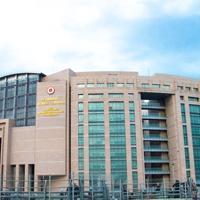
 Daily Agenda2 months ago
Daily Agenda2 months ago5 suspects nabbed for sharing information with Iranian intel
-
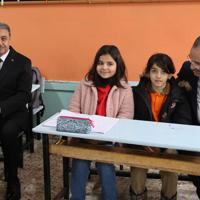
 Politics2 months ago
Politics2 months agoSoutheastern city enforces fines to tackle student absenteeism
-
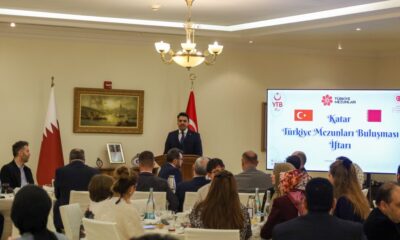
 Lifestyle2 months ago
Lifestyle2 months agoTürkiye’s Embassy in Doha hosts iftar for alumni to foster connections
-
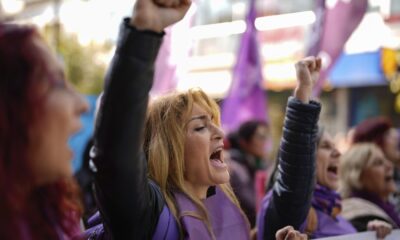
 Refugees2 months ago
Refugees2 months agoInternational Women’s Day: global protests demand equal rights
-

 Daily Agenda2 months ago
Daily Agenda2 months agoTrump hangi ülkelere yasak getirdi.
-
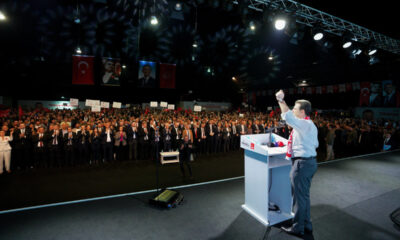
 Politics2 months ago
Politics2 months agoImpressions from İmamoğlu’s Antalya rally
-
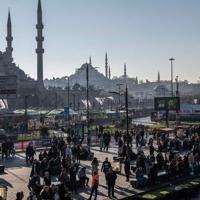
 Politics2 months ago
Politics2 months agoIstanbul ‘may break 110-year temperature record for March’
-

 Sports2 months ago
Sports2 months agoPaulista 19 maç sonra geri döndü, maç sonrası isyan etti

